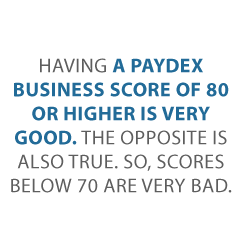- Connect With Us!
- (877) 600-2487
- info@creditsuite.com
Do you have a PAYDEX Score? Learn How to Get a PAYDEX Score Fast
Published By Credit Suite at October 30th, 2015
Find Out How to Get a PAYDEX Score Fast
So, you probably have personal credit scores established. And you are probably familiar with your scores at Equifax, Experian, and Trans Union. So, do you need to do how to get a PAYDEX score fast?
But do you have a PAYDEX business credit score yet?
The main credit score used in the business world is known as PAYDEX. It comes from Dun and Bradstreet.
This number assesses a business’s lending risk. This is much the same as a consumer credit score reflects a consumer’s individual credit risk.
What’s the Definition of a PAYDEX?
The exact definition comes from Dun & Bradstreet, or D&B.
The D&B PAYDEX® Score is D&B’s unique dollar-weighted numerical indicator of how a firm paid its bills over the past year, based on trade experiences reported to D&B by various vendors.
There are many big differences from a business PAYDEX and an individual FICO credit score.
So, consumer FICO credit scores range from 350 to 850. The PAYDEX ranges from 0 to 100 with 100 being the highest score you can get.
Having a PAYDEX business score of 80 or higher is very good. The opposite is also true. So, scores below 70 are very bad.
Where Do PAYDEX Numbers Come From?
Individual credit scores have a basis from a number of factors. The PAYDEX comes from one single factor. All that matters is if a business makes prompt payments to its suppliers and creditors within the agreed upon terms of payment.
For example, prompt payments will produce a PAYDEX total of 80. A 70 score reflects paying 15 days behind, 60 score is 22 days behind, a 30 score reflects paying 90 days behind. And a 20 PAYDEX reflects paying bills 120 days late.
What’s So Important About How to Get a Good PAYDEX Fast?
If you own a business, your PAYDEX numbers are essential when it comes to establishing new credit. And it necessary for continuing to build credit limits exceeding $100,000.

 " class="attachment-blog-single size-blog-single wp-post-image" alt="Get Business Credit Cards for New Businesses Credit Suite-Business Line of Credit Decoded" title="Get Business Credit Cards for New Businesses">>
" class="attachment-blog-single size-blog-single wp-post-image" alt="Get Business Credit Cards for New Businesses Credit Suite-Business Line of Credit Decoded" title="Get Business Credit Cards for New Businesses">>